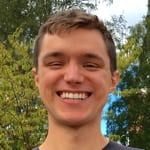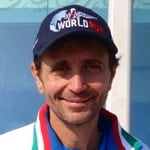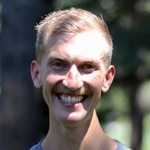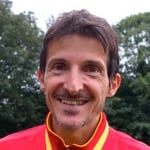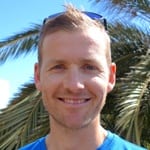 The 2018 IAU 100k World Championships will be run through the village of Sveti Martin na Muri and its surrounding farmlands and forests in northern Croatia. The paved, lightly undulating course begins with one 2.5km out-and-back, before 13 repetitions of a 7.5km out-and-back route. Cumulative elevation gain for the whole course rings in at about 800 meters. Average temperatures are moderate with moderate or higher humidities.
The 2018 IAU 100k World Championships will be run through the village of Sveti Martin na Muri and its surrounding farmlands and forests in northern Croatia. The paved, lightly undulating course begins with one 2.5km out-and-back, before 13 repetitions of a 7.5km out-and-back route. Cumulative elevation gain for the whole course rings in at about 800 meters. Average temperatures are moderate with moderate or higher humidities.
The race starts at 7 a.m. CEST on Saturday, September 8, which corresponds to Friday, September 7th at 11 p.m. MDT in the United States. You’re correct in presuming that we’ll be covering the 2018 IAU 100k World Championships live!
The race includes both individual and team competitions with each team ranked based on its top-three finishers’ combined times. With a high correlation between top individual runners and top teams at the IAU 100k World Championships, we’ll start by looking at some of the team favorites and their runners before looking at some additional standout contenders.
Thanks to Squirrel’s Nut Butter for jumping in at the last minute to sponsor our coverage of the IAU 100k World Championships!
Ps. When you’re done with this preview, check out our women’s preview, if you haven’t already! Then, follow our live coverage on race day.
Support iRunFar
 Like what we’re doing? Please consider becoming a monthly supporter of iRunFar on Patreon or making a one-time donation via PayPal in support of our coverage of the IAU 100k World Championships. We’ve also got some great products in the new iRunFar Store! Your support helps make iRunFar happen. Thank you!
Like what we’re doing? Please consider becoming a monthly supporter of iRunFar on Patreon or making a one-time donation via PayPal in support of our coverage of the IAU 100k World Championships. We’ve also got some great products in the new iRunFar Store! Your support helps make iRunFar happen. Thank you!
South Africa
What’s the most stacked ultramarathon in the world every year? The Comrades Marathon in South Africa, which is, in turn, home to a ridiculously strong cadre of road ultramarathoners. Now that South Africa sends a team to 100k worlds, they’re instant contenders. In fact, they were strong enough to beat out everyone to win the most recent team 100k worlds in Spain back in 2016.
This year, watch out for Bongmusa Mthembu (pre-race interview), who was the 2016 runner up in 6:24:06. Since then, he’s added his second and third Comrades Marathon victories, winning this year’s ‘down’ race with a time of 5:26:34 for 90km. He also won Comrades in 2014. To go with his three Comrades wins, he’s also taken second (2012) and third (2016) at the legendary race.
Although he’s now 43 and has faltered at the past two Comrades (48th in 2017, 43rd in 2018), Claude Moshiywa won Comrades in 2013 and proceeded to take seventh and sixth in 2015 and 2016. Going back further, he has a slew of top 20 Comrades finishes, including a third in 2011. The relative youngster on the team is 31-year-old Nkosinathi Duma, who’s rapidly improved at Comrades over the past three years, going from 159th to 16th to 10th. Other team members include Thusio Mosiea (10th 2015 Comrades) and Best Ngwenya (22nd 2017 Comrades). It appears that Mthembu is the only returning member from the 2016 championship team.
Japan
Nearly always strong, the Japanese team took second at the 2016 100k worlds just as they did in 2014. This year’s strong team will start with 2016 100k world champion Hideaki Yamauchi, who ran a personal best of 6:18:22 to win the race. Hideaki appears in good form again this year, running the Lake Saroma 100km in June in 6:23:49, more than 15 minutes faster than when he ran Lake Saroma prior to his 2016 world championship, to take fourth. Lake Saroma was the Japanese team qualifier for worlds, with each of the three men who beat Hideaki now on Team Japan.
That would include the, now, 100k world record holder, Nao Kazami (pre-race interview). At Lake Saroma he ran 6:09:14, taking more than a minute off Don Ritchie’s track-based overall world record of 6:10:20 set all the way back in 1978. Kazumi is a 2:17 marathoner with what I believe is a previous personal best of 6:33:52 at last year’s Lake Saroma 100k. He did win last year’s IAU 50k World Championship “test race” in 3:06:56, where the competition at that event was not on par with normal IAU World Championships, as it was a fill-in event after the race set for Doha, Qatar was cancelled. Despite finishing more than 10 minutes back at Lake Saroma, Koji Hayasaka ran a blistering 6:20:49 to take second and make the Japanese squad. As best as I can tell, this was nearly a half-hour improvement on his 100k personal best. Previously, he’d run 6:45:28 at Lake Saroma in 2015. Hayasaka has experience at 100k worlds, having taken 32nd in 7:29 in Qatar in 2014. Running-magazine editor Takehiko Gyoba was third at Lake Soroma in 6:22:55. It appears that both Hayasaka and Gyoba have marathon PRs a few seconds under 2:20.
United States
The U.S. squad took third in 2016 and won team gold in 2014. While the team won’t be returning Patrick Reagan, who led the 2016 team with his third-place finish, they will return their second, third, and fifth runners from their most recent team. Geoff Burns (pre-race interview) whose 6:38 was good enough for fifth in 2016, is back. Since then, Geoff has run 5:14 for 50 miles at the Chicago Lakefront 50 Mile last October and taken 12th at this year’s Comrades. In 2016, Chikara Omine was the third U.S. runner, taking 18th in 6:48. Chikara has run on the U.S. team at least three times with his 2016 as his fastest, but having taken ninth overall way back in 2010. Matt Flaherty also returns, having placed 25th in 6:56 in 2016 and 24th in 7:01 in 2015 at the 100k World Championships. More often a trail runner, Matt has taken fifth at both the Way Too Cool 50k and Eiger Ultra Trail 101k this year.
There will be a few runners making their debut for Team USA, all coming out of top placings at the Mad City 100k these past two years. Anthony Kunkel won this year’s Mad City 100k in 6:52:10. In 2016 and 2017, he was second (5:52) and third (6:05), respectively, at the JFK 50 Mile. Jesse Davis won last year’s Mad City 100k in 7:06 after representing the U.S. at the IAU 50k World Championships in Qatar in 2015, where he was fifth in 2:59:05. In taking second to Davis at last year’s Mad City 100k in 7:10:43, Isaiah Janzen also earned his place on the U.S. team. Last year, he also split 15:15 for 100 miles at the Desert Solstice 24 Hour.
Italy
Italy took second at the 2015 100k WC, and it wouldn’t be a shock if they again landed on the podium. They’ll be led by Giorgio Calcaterra, who won the 100k World Championships in 2011 in 6:27:32 and 2012 in 6:23:30, the latter of which remains his 100k personal best. He had a poor 100k WC in Qatar in 2014, but took third in 6:36 in 2015 and seventh in 6:41 in 2016. Now 46 years old, Giorgio has run two 100ks since the start of 2017, clocking 7:03 and 7:32. Of course, father time isn’t always a detriment. Despite turning 47 last year, Andrea Zambelli ran a 100k personal best of 6:54:36 this May. Zambelli has run the past two 100k WCs, taking 23rd in 7:00:51 in 2015 and 29th in 7:06:29 in 2016. Also now age 47, Hermann Achmüller ran his 100k PR of 6:54:50 as part of that 2015 silver-medal team. He was 14th overall that year. He was a more distant 36th in 7:12 at the 2016 championships.
There will be a few new faces on the Italian team this year, specifically: Matteo Lucchese and Francesco Lupo who ran 100k PRs of 7:03:08 and 7:13:15, respectively, earlier this year.
Sweden
Although they’ll have the disadvantage of only having three team members, Sweden no longer has a full team racing, but they could still have a couple runners at the front of the race. I’ll start with Elov Olsson as he led the Swedish team with a 6:44:24 for 11th place at the 2016 100k World Championships. The next Swede from that race, who’s also returning this year, was Fritjof Fagerlund barely a minute back in 14th in 6:45:28. That one-two punch should have put them in contention for a strong team finish, but they didn’t have a full team finish. Since those world championships, Elov has notably taken 12th at the Western States 100 Mile and won Ultravasan in 2017 and taken 22nd at Comrades this year, while Fritjof has been 10th and 15th at the past two Comrades, while winning Ultravasan this August. Going back a bit farther, Fritjof was 10th (6:55:30) at the 2014 100k WC and sixth (6:42:51) in 2015. For the Swedish team to succeed, they might need another 100k PR out of Linus Wirén, who just set his best of 7:09:48 this July. We’ve learned that the third Swedish team member, Linus Wirén, is ill and will not be racing. [Update Sept 7]
Other Team Notes
France was third in 2015. In addition to Jerome Bellanca mentioned below, the squad has runners with strong, recent 100k PRs, such as Fabien Chartoire (7:00:49 – 2016) and David Duquesnoy (7:04:04 – 2016).
Spain has two standout runners in Jose Antonio Requejo and Asier Cuevas and, then, three guys—Daniel Hernando, Jaun Antonio Ramos, and Jose Antonio Castillo—with 100k PRs in the 7:10-12 range. Team Spain would need a breakout race from one of these three for a top team result.
Australia returns its top-four men from its 2016 fifth-place squad, including Brendan Davies, who’s discussed below. [Sept 4 Update: It sound like two the guys have just pulled out of the race.]
Additional Top Men to Watch
I believe that Spain’s Asier Cuevas might have the highest 100k World Championships placing (at least this decade) of someone I’ve not yet profiled. He took second in Winschoten at the 2015 100k worlds with a time of 6:35:49, which might be his personal best, as well. Since then, he’s won the 2017 Winschoten 50k in 3:00:18 and finished 46th at this year’s Comrades Marathon. Back in 2012, he was fourth at the 100k WC in 6:44.
Sticking with Spain, Jose Antonio Requejo ran 6:37:00 to take third at the 2014 100k World Championships and, then, backed that up with a sixth-place finish in 6:41:08 at the 2016 100k WC. He was also 13th at the 100k WC back in 2011.
Wouter Decock of Belgium has a faster PR than either of the two gentlemen above, having run 6:33:52 in 2016. A year earlier, he was fifth at the 100k WC in 6:41:27. Last year, he handily won the Winschoten 100k in 6:46:12.
Last year, the U.K.’s Lee Grantham ran a 6:42:42 100k at the Meridian Ultra Road Race. Last year, he also ran a marathon PB of 2:21:49 at the London Marathon.
In 2015, France’s Jerome Bellanca ran 6:43:41 to take eighth at the 100k WC. He’d previously run a 6:43:45 in 2015 and a 6:47:41 in 2013. Last year, he ran a 7:04:01 100k in France to win what might have been the French team qualifying race.
At the 2016 100k WC, Australia’s Brendan Davies outlasted Elov Olsson by 4 seconds to take 10th in 6:44:20. He’s run 6:56 and change at the two previous 100k WCs, where he took 12th in 2014 and 19th in 2015. Yes, this is the same Brendan Davies you might know from the trails with such results as eighth at the 2014 Western States 100 Mile and first at this year’s Ultra-Trail Australia.
If you follow iRunFar, you’ve undoubtly seen Didrik Hermansen’s name over the past few years. He’s found great success on the trails (2nd 2016 Western States 100, 1st 2016 Transgrancanaria, 1st 2015 Lavaredo Ultra Trail), but he also has a long history and steady improvement in road ultras. He was 15th in his 100k PR of 6:45:43 at the 2016 100k WC. At the world championships two years earlier, he was 21st in 7:11.
Andre Collet of Germany is no stranger to success at the 100k World Championships. In 2010, he was sixth in 6:51. In 2011, he was ninth in 7:04. In 2012, he was again sixth, this time in 6:45:48. Most recently, he was 13th in 6:44:54 in 2016.
Finland’s Henri Ansio is a runner that you’re as likely to see at the Trail World Championships as you are to see him at the 100k WC on the road. Ansio set his 100k PR of 6:46:16 two years ago in taking 16th at the 100k WC. That’s some solid improvement over 8:07 for 70th in 2014 and 7:07 for 30th in 2015.
Ranno Erala of Estonia ran 6:47:40 to take 17th at the 2016 100k WC. He was eighth, sixth, and sixth at the Ultravasan 90k from 2015-17.
Other Men to Watch
- Anthony Clark (U.K.) – 7:00:37 at a 100k in March 2018
- Karsten Fischer (Germany) – 22nd 2016 100k WC (6:54:52)
- Oleksandr Holovnytskyy (Ukraine) – 6:37:32 100k PR from 2004; 15th 2015 100k WC (6:56:03); 5th 2010 100k WC (6:51:03)
- Barry Keem (Australia) – 28th 2016 100k WC (7:02:47); 25th 2015 100k WC (7:01:50)
- Philibus Sharubutu (Nigeria) – 10th 2016 50k WC (3:07:36)
- Pascal van Norden (Netherlands) – 24th 2016 100k WC (6:55:13); 22nd 2015 100k WC (6:58:07); 6:55:10 at 2017 Winschoten 100k
The full entrants list is available.
Call for Comments
- So what runner is going to win this thing? Who’ll make the podium?
- Any predictions on how the team races will sort out?
- There are lots of runners in this race who we don’t often see, so please point out anyone we may have overlooked as well as share additional information for those we have mentioned!
- Also, just let us know more about the top runners from your country who will be racing no matter if they’re a podium contender or not!
